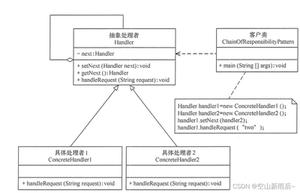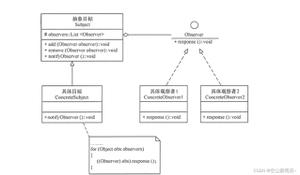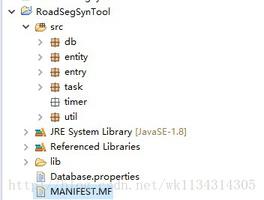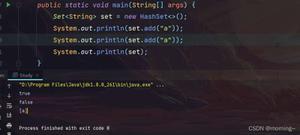Java awt-对话框简单实现方式
Java awt-对话框简单实现
import java.awt.*;
import java.awt.event.*;
import javax.swing.*;
public class dia
{
public static void main(String args[])
{
JButton btn1=new JButton("modal");
JButton btn2=new JButton("unmodal");
JFrame f=new JFrame("DIaloDemo");
f.setSize(300,400);
f.setLocation(300,200);
f.setLayout(new FlowLayout());
f.add(btn1);
f.add(btn2);
f.setDefaultCloseOperation(JFrame.EXIT_ON_CLOSE);
f.setVisible(true);
final JLabel label=new JLabel();
final JDialog dialog=new JDialog(f,"Dialog");
dialog.setSize(220,150);
dialog.setLocation(350,250);
dialog.setLayout(new FlowLayout());
final JButton btn3=new JButton("sure");
dialog.add(btn3);
btn1.addActionListener(new ActionListener(){
public void actionPerformed(ActionEvent e){
dialog.setModal(true);
if(dialog.getComponents().length==1){
dialog.add(label);
}
label.setText("modal dialog,click to close");
dialog.setVisible(true);
}
});
btn2.addActionListener(new ActionListener(){
public void actionPerformed(ActionEvent e){
dialog.setModal(false);
if(dialog.getComponents().length==1){
dialog.add(label);
}
label.setText("unmodal dialog,click to close");
dialog.setVisible(true);
}
});
btn3.addActionListener(new ActionListener(){
public void actionPerformed(ActionEvent e){
dialog.dispose();
}
});
}
}



Java awt Dialog(对话框)学习
Dialog是Window类的子类,是一个容器类,属于特殊组件。对话框是可以独立存在的顶级窗口,因此用法与普通窗口的用法几乎完全一样。
对话框有如下两点需要注意
(1)对话框通常依赖于其他窗口,就是通常有一个parent窗口
(2)对话框有非模式(non-modal)和模式(modal)两种,当某个模式对话框被打开之后,该模式对话框总是位于它依赖的窗口之上;在模式对话框被关闭之前,它依赖的窗口无法获得焦点
对话框有多个重载构造器
它的构造器可能有如下3个参数:
(1)owner:指定该对话框所依赖的窗口,既可以是窗口,也可以是对话框。
(2)title:指定该对话框的窗口标题
(3)modal:指定该对话框是否是模式的,true货false
/**
* 程序示范了模式对话框和非模式对话框的用法
*/
package codes11;
import java.awt.BorderLayout;
import java.awt.Button;
import java.awt.Dialog;
import java.awt.Frame;
import java.awt.event.ActionEvent;
import java.awt.event.ActionListener;
public class DialogTest {
Frame f = new Frame("测试");
Dialog d1 = new Dialog(f, "模式对话框", true);
Dialog d2 = new Dialog(f, "非模式对话框", false);
Button b1 = new Button("打开模式对话框");
Button b2 = new Button("打开非模式对话框");
public void init() {
d1.setBounds(20, 30, 300, 400);
d2.setBounds(20, 30, 300, 400);
b1.addActionListener(new ActionListener() {
@Override
public void actionPerformed(ActionEvent arg0) {
d1.setVisible(true);
}
});
b2.addActionListener(new ActionListener() {
@Override
public void actionPerformed(ActionEvent arg0) {
d2.setVisible(true);
}
});
f.add(b1);
f.add(b2, BorderLayout.SOUTH);
f.pack();
f.setVisible(true);
}
public static void main(String[] args) {
new DialogTest().init();
}
}
上面程序创建了d1和d2两个对话框,其中d1是一个模式对话框,而d2是一个非模式对话框(两个对话框都是空的)。该窗口中还提供了两个按钮,分别用于打开模式对话框和非模式对话框。打开模式对话框后鼠标无法激活原来的”测试窗口“;但打开非模式对话框后还可以激活原来的”测试窗口“。
运行程序,结果如下图:

不管是模式对话框还是非模式对话框,打开后都无法关闭它们,因为程序没有为这两个对话框写事件监听器。如果主程序需要对话框里接收的输入值,则应该把对话框设置成模式对话框,因为模式对话框会阻塞该程序;如果把对话框设置成非模式对话框,则可能造成对话框被打开了,但用于并没有操作该对话框,也没有向对话框里进行输入,这就会引起主程序的异常。
Dialog类还有一个子类:FileDialog,它代表一个文件对话框,用于打开或者保存文件。FileDialog也提供了几个构造器,可分别支持parent、title和mode三个构造参数,其中parent、title指定文件对话框的所属父窗口和标题;而mode指定该窗口用于打开文件或保存文件,该参数支持如下两个参数值:FileDialog.LOAD、FileDialog.SAVE。
FileDialog不能指定是模式对话框或非模式对话框,因为FileDialog依赖于运行平台的实现,如果运行平台的文件对话框是模式的,那么FileDialog也是模式的;否则就是非模式的。
FileDialog提供了两个方法来获取被打开/保存文件的路径
(1)getDirectory():获取FileDialog被打开/保存文件的绝对路径
(2)getFile():获取FileDialog被打开/保存文件的文件名
package codes11;
import java.awt.BorderLayout;
import java.awt.Button;
import java.awt.FileDialog;
import java.awt.Frame;
import java.awt.event.ActionEvent;
import java.awt.event.ActionListener;
public class FileDialogTest {
Frame f = new Frame("Test");
FileDialog d1 = new FileDialog(f, "选择需要打开的文件", FileDialog.LOAD);
FileDialog d2 = new FileDialog(f, "选择需要保存文件的路径", FileDialog.SAVE);
Button b1 = new Button("打开文件");
Button b2 = new Button("保存文件");
public void init() {
b1.addActionListener(new ActionListener() {
@Override
public void actionPerformed(ActionEvent arg0) {
d1.setVisible(true);
System.out.println(d1.getDirectory() + d1.getFile());
}
});
b2.addActionListener(new ActionListener() {
@Override
public void actionPerformed(ActionEvent arg0) {
d2.setVisible(true);
System.out.println(d2.getDirectory() + d2.getFile());
}
});
f.add(b1);
f.add(b2, BorderLayout.SOUTH);
f.pack();
f.setVisible(true);
}
public static void main(String[] args) {
new FileDialogTest().init();
}
}
运行程序,结果如下图:

以上为个人经验,希望能给大家一个参考,也希望大家多多支持。
以上是 Java awt-对话框简单实现方式 的全部内容, 来源链接: utcz.com/p/251298.html









